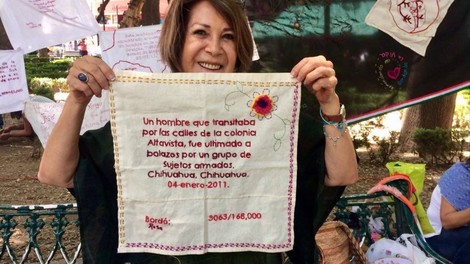Your podcast discovery platform
Curious minds select the most fascinating podcasts from around the world. Discover hand-piqd audio recommendations on your favorite topics.

piqer for: Global finds Doing Good
Helen Morgan is a writer and editor with a background in human rights and migration issues. She is an associate editor at Devex, the media platform for the global development community, focusing on multimedia storytelling and video production for thematic and issue-focused digital series. Currently based in Barcelona, Spain, she has previously written for a variety of international publications while living and working in Buenos Aires, New York and Shanghai.
Activists Use Embroidery To Protest Mexico's Murder Epidemic
Embroidery is not necessarily the most obvious technique for commemorating a tragedy, but stitching is one technique that Fuentes Rojas, a collective in Mexico that reclaims public space through peaceful protest, uses to remember those who have been disappeared or killed in the country.
The collective meets regularly in a park in Coyoacán in Mexico City, Frida Kahlo's old neighbourhood, to embroider white handkerchiefs with the names of the people who have been disappeared, or murdered. This article explains:
Rows of handkerchiefs between the trees, fluttering in the early Sunday afternoon breeze. Some are simple, threaded with stark black block letters, while others bear an elaborate, blood-red outline of Mexico. Each one carefully spells out a name and tells a story.
Turning craft into a political statement might be nothing new, the article states, but in Mexico, Fuentes Rojas gave rise to a new wave of "craftivism".
The craft is political, but it is not ‘art’, according to one member of the collective.
"Our work is a political statement. We prefer not to call it art,” before elaborating that “by calling it art, we’d be closing off our protest to elitist spaces.”
The collective is responding a tragic and important issue in Mexico. Last November the government reported that more than 34,000 people have been reported missing since 2006 — when former President Felipe Calderón began his “war on drugs” — according to Human Rights Watch. But the truth is no one knows how many people are missing.
